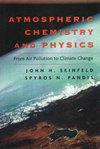Quantifying the Impacts of Marine Aerosols over the Southeast Atlantic Ocean using a chemical transport model: Implications for aerosol-cloud interactions
IF 5.1
1区 地球科学
Q1 ENVIRONMENTAL SCIENCES
引用次数: 0
Abstract
Abstract. The southeast Atlantic region, characterized by persistent stratocumulus clouds, has one of the highest uncertainties in aerosol radiative forcing and significant variability across climate models. In this study, we analyze the seasonally varying role of marine aerosol sources and identify key uncertainties in aerosol composition at cloud-relevant altitudes over the southeast Atlantic using the GEOS-Chem chemical transport model. We evaluate simulated aerosol optical depth (AOD) and speciated aerosol concentrations against those collected from ground observations and aircraft campaigns such as LASIC, ORACLES, and CLARIFY, conducted during 2017. The model consistently underestimates AOD relative to AERONET, particularly at remote locations like Ascension Island. However, when compared with aerosol mass concentrations from aircraft campaigns during the biomass burning period, it performs adequately at cloud-relevant altitudes, with a normalized mean bias (NMB) between −3.5 % (CLARIFY) and −7.5 % (ORACLES). At these altitudes, organic aerosols (63 %) dominate during the biomass burning period, while sulfate (41 %) prevails during austral summer, when dimethylsulfide (DMS) emissions peak in the model. Our findings indicate that marine sulfate can account for up to 69 % of total sulfate during high DMS period. Sensitivity analyses indicate that refining DMS emissions and oxidation chemistry may increase sulfate aerosol produced from marine sources, highlighting their overall importance. Additionally, we find marine primary organic aerosol emissions may substantially increase total organic aerosol concentrations, particularly during austral summer. This study underscores the imperative need to refine marine emissions and their chemical transformations to better predict aerosol-cloud interactions and reduce uncertainties in aerosol radiative forcing over the southeast Atlantic.利用化学传输模型量化东南大西洋海洋气溶胶的影响:气溶胶-云相互作用的影响
摘要大西洋东南部地区以持久的层积云为特征,是气溶胶辐射强迫不确定性最高的地区之一,而且不同气候模式之间存在显著差异。在本研究中,我们利用 GEOS-Chem 化学传输模式分析了海洋气溶胶源的季节性变化作用,并确定了东南大西洋上空云相关高度气溶胶组成的主要不确定性。我们将模拟的气溶胶光学深度(AOD)和特定气溶胶浓度与地面观测和飞机活动(如 2017 年开展的 LASIC、ORACLES 和 CLARIFY)收集的数据进行了对比评估。与 AERONET 相比,该模型始终低估了 AOD,尤其是在阿森松岛等偏远地区。然而,当与生物质燃烧期间飞机活动产生的气溶胶质量浓度进行比较时,该模型在与云有关的高度表现适当,归一化平均偏差(NMB)在-3.5%(CLARIFY)和-7.5%(ORACLES)之间。在这些海拔高度,有机气溶胶(63%)在生物质燃烧期间占主导地位,而硫酸盐(41%)在澳大利亚夏季占主导地位,此时二甲基硫化物(DMS)排放量在模型中达到峰值。我们的研究结果表明,在二甲基硫化物排放高峰期,海洋硫酸盐可占硫酸盐总量的 69%。敏感性分析表明,改进 DMS 排放和氧化化学性质可能会增加海洋来源产生的硫酸盐气溶胶,从而突出其整体重要性。此外,我们还发现海洋原生有机气溶胶排放可能会大幅增加总有机气溶胶浓度,尤其是在澳大利亚夏季。这项研究强调,必须完善海洋排放及其化学转化,以更好地预测气溶胶与云的相互作用,减少东南大西洋上空气溶胶辐射强迫的不确定性。
本文章由计算机程序翻译,如有差异,请以英文原文为准。
求助全文
约1分钟内获得全文
求助全文
来源期刊

Atmospheric Chemistry and Physics
地学-气象与大气科学
CiteScore
10.70
自引率
20.60%
发文量
702
审稿时长
6 months
期刊介绍:
Atmospheric Chemistry and Physics (ACP) is a not-for-profit international scientific journal dedicated to the publication and public discussion of high-quality studies investigating the Earth''s atmosphere and the underlying chemical and physical processes. It covers the altitude range from the land and ocean surface up to the turbopause, including the troposphere, stratosphere, and mesosphere.
The main subject areas comprise atmospheric modelling, field measurements, remote sensing, and laboratory studies of gases, aerosols, clouds and precipitation, isotopes, radiation, dynamics, biosphere interactions, and hydrosphere interactions. The journal scope is focused on studies with general implications for atmospheric science rather than investigations that are primarily of local or technical interest.
 求助内容:
求助内容: 应助结果提醒方式:
应助结果提醒方式:


